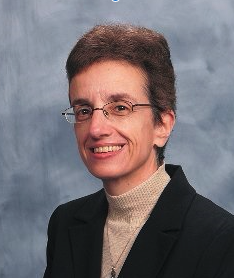Science cannot exist without religion, and vice versa. The science of evolution plays into the work of God, said Franciscan Sr. Ilia Delio OSF, who works to transform people’s perception of reality into a new understanding of religion in the 21st century.
Delio, who is the Josephine C. Connelly Endowed Chair in Christian Theology at Villanova University, will give her lecture, titled “Infinite Matter, Infinite God: In Search of a New Myth,” at 2 p.m. Tuesday, July 19, in the Hall of Philosophy for the Interfaith Lecture Series.

“Ilia Delio is a cosmic thinker,” said Director of Religion Maureen Rovegno. “Ilia’s consciousness echoes theologian Paul Tillich in universally applicable contexts, and her wisdom for how ‘being’ is evolving in our understanding will be inspiring in a way that will make us all smile.”
The main and first point of her lecture is that matter, matters. Everything in the world — every organism, tree branch, human cell, bird and critter — is made up of matter. Delio cites Tillich and his idea of new materialism, which states matter has its own life force.
“There’s a consciousness that runs throughout nature, there’s a life force that is … basically what we call God. God is the power that’s existing throughout all existence,” Delio said. “I think that’s a real radical turn from our idea of ‘the old guy in the sky.’ ”
With the reality of the fractured state of the world including global warming, environmental crises and more, Delio said people have a naive understanding of matter.
“The first thing is to recognize that matter has divine properties,” Delio said. “Matter is the place of the sacred. Matter is not just particles interacting with one another; matter has an infinite depth.”
The second point in her lecture focuses on wanting her audience to understand that their minds matter. The more mindful people are, the more matter will matter.
Delio’s third point focuses on reshaping people’s perception of God.
“God is nothing like you thought. God is really the whole that keeps driving us onward, and toward which we seek to become the whole within every whole,” Delio said. “I think God is that future and that pull into a world of unity, where peace and charity can really reign, so matter, matter your mind, (be) mindful of our matter and know that God is entangled with the whole thing.”
Franciscan sisters follow the spirituality of St. Francis of Assisi, a medieval saint who found God in nature. As such, they strive to do the same.
“The (reward) is constantly being in touch with the sacred depths of nature, with the God-depths of our reality of our world, of our own selves, of what we’re trying to become,” Delio said. “It’s also challenging because a lot of religion is pretty much stuck with old paradigms, and trying to find ways to shift, like science has undergone significant changes.”
Modern science and technology have made massive advancements, but religion has not made as many. Delio said religion is tied to old structures and philosophical systems, and she tries to transform these paradigms regardless of the challenging opinions of skeptics.
Before becoming a sister, Delio was a research scientist in brain and spinal cord research. She said she loved pursuing unknown questions and decided to continue to pursue those questions in theology.
“A lot of my work has just been trying to ask ‘How do these two disciplines work together?’ And so I just kind of fell in it because I have degrees in both,” Delio said. “It was just natural to try to work bringing these things together.”
Delio said science and religion belong together and when they remain separated, it furthers the world’s problems.
“We can bring religion back into a healthy place in our lives where we can see that no matter what we’re doing, we’re in search of something, we’re in search of more meaning,” Delio said. “I think science can help us know this world. I think religion can help us orient ourselves in this world.”




